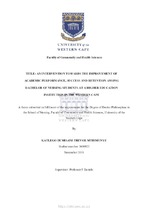| dc.description.abstract | Academic success, which is measured by continuous assessment and
examination results, is one of the major goals of higher education. However, Higher Education
institutions worldwide are faced with a challenge on how to improve the academic
performance, success and ultimately the retention of students during their studies.
Aim: The aim of this study was to develop an intervention towards the improvement of
academic performance, success and retention among undergraduate nursing students at a
university in the Western Cape, South Africa.
Methods: A multi-method research approach was employed to meet the study aim and
objectives. The study was conducted in three phases that were guided by the adapted phases of
the Design and Development (D&D) model by Rothman and Thomas (2013). Phase one (Study
1– 4) was the problem analysis and information gathering phase. Phase two was the design and
early development during which designing observational elements and specifying procedural
elements were applied. Phase three (Study 5) was the validation phase.
Results: This thesis comprised of five interdependent studies. Study 1: A systematic review
of literature was conducted encompassing previous literature from 2006 to 2016 regarding the
predictors of academic performance and success among undergraduate nursing students. It was
found that satisfactory academic performance among nursing students is associated with older
age, female gender, English language proficiency, majority ethnic status, pre-admission
academic achievements, selecting nursing as first choice for study, participating in organised
music programmes, active academic engagement, as well as psychological and emotional
factors. Study 2: Undergraduate nursing students’ (n =232) perceptions regarding their
educational environment were explored. This study showed that generally the nursing students
were positive about their educational environment. However, the findings indicated that
enhancements are required to improve the conditions of the educational environment. Study
3: The study explored the challenges experienced by undergraduate nursing students (6 - focus
group discussions) regarding their academic performance and success and the measures
implemented to overcome these challenges. The findings revealed that students’ academic
performance is influenced by the students’ economic background, place of residence,
inadequate theoretical and clinical support and the unfavorable educational environment.
However, the findings also indicated that students employ a surface approach to learning,
maintain a positive attitude and remain academically engaged in response to these challenges.
Study 4: The study explored the challenges experienced by nurse educators (n = 8) regarding
the academic performance, success and retention of undergraduate nursing students and the
measures implemented to overcome these challenges. The findings revealed that students’
academic performance is influenced by poor class attendance, lack of academic readiness,
socioeconomic backgrounds, English language proficiency, structure of the programme, the
educational environment and the working conditions for nurse educators. Study 5: A three
round Delphi study was conducted to validate an intervention towards improving the academic
performance, success and retention among nursing students. The intervention was structured
into eleven categories that emerged from phase 2: (1) Select high quality prospective nursing
students; (2) Provide English language support; (3) Promote class attendance; 4) providing
financial support to deserving students; (5) Provide university residence to undergraduate
nursing students; (6) Encourage family support and involvement; (7) Make the undergraduate
nursing programme student-friendly; (8) Ensure a conducive teaching and learning
environment; (9) Enhance theoretical and clinical support to undergraduate nursing students at
all times; (10) Ensure uniformity and consistency in the process of teaching and learning as
well as; (11) Provide support to nurse educators and clinical supervisors.
Conclusion: The findings of this study have several implications for the education of nursing
students. The developed intervention may help promote better understanding of the academic
performance, success and retention of nursing students. | en_US |

